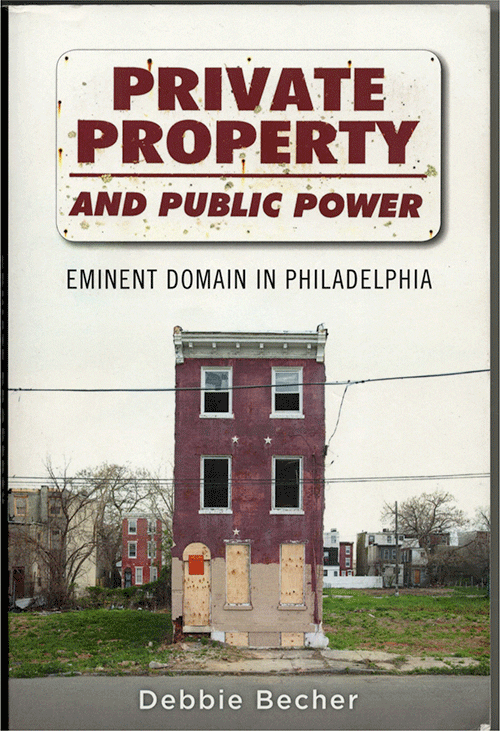Every once in a while, someone takes a dissertation and turns it into a book that you actually want to read, even if you are not also getting a PhD in exactly the same thing. And then, unfortunately, someone puts a title on it that says “I’m a dissertation made into a book!” and you won’t read it. And this is a shame.
Titles are hard to write, so I don’t want to pick on whoever came up with the title of Private Property and Public Power: Eminent Domain in Philadelphia too much—rather, I want to make sure everyone knows that the book is so much more than it promises, and is something worth reading for anyone who is interested in community development, urban revitalization, good governance, or community organizing around issues of space, development, and displacement.
Debbie Becher’s research is substantial, and a wonderful combination of quantitative and qualitative. She reviewed every single instance of eminent domain in Philadelphia from 1992 to 2007, and categorizes them by their context and whether there was any protest, quickly dispatching the libertarian fantasy that eminent domain always faces resistance (it almost never does).
But then Becher delves deeply into two cases that were highly contested, and which had opposite outcomes—in the case of American Street, initial support for the use of eminent domain eroded as it was handled in a way that didn’t respect residents’ investments in the land and then didn’t produce anything of value. In the other case, Jefferson Square, vocal opposition up front was turned into support as the plan was reworked to better acknowledge the connections of the existing residents to their homes.
Despite having an academic habit of unnecessarily summarizing and foreshadowing, Becher missed a calling as a journalist. She tells a story in a way that leaves the reader feeling like they understand the characters and dynamics without drowning in too many details. When you have from your research assuredly more details than your readers will care about, it is a challenging and impressive feat to not lose the story in them, but she does it well.
Even better is when you can tell those stories in a way that supports a truly new and useful proposition about how the world works and therefore how it could work better. I am a sucker for a surprising new idea. It makes me feel like I’m back in college, in a good way. In an age of constant bombardment with “astounding new way to do xyz” lists, 99 percent of which seem to boil down to easier-said-than-done clichés like “collaborate” and “think comprehensively,” it can be startling to find an analysis that actually feels new hidden in something that seemed far less ambitious.
So it is with Private Property and Public Power. Becher argues that her research findings suggest that people actually understand private property differently than either of the two standard descriptions—strict financial value or strict use value. She argues that people consider their rights to property to involve investment, of all kinds—financial, sweat, time, emotional, future planning. Therefore, eminent domain runs into trouble when it doesn’t respect and enhance that investment, in all its forms.
Though she does offer a pretty solid set of recommendations for predicting when there’s going to be conflict about the use of eminent domain and crafting policy to avoid it, this analysis has implications far beyond that. Really, this novel understanding of property and investment and what the government’s legitimate role is understood to be in relationship to that investment could inform, and probably improve, any kind of redevelopment or revitalization effort, especially one that might involve some displacement. For that reason, I suggest that everyone in the community development field could benefit from learning the broader lessons Becher has teased out of a couple decades of Philadelphia eminent domain cases for us.





Comments